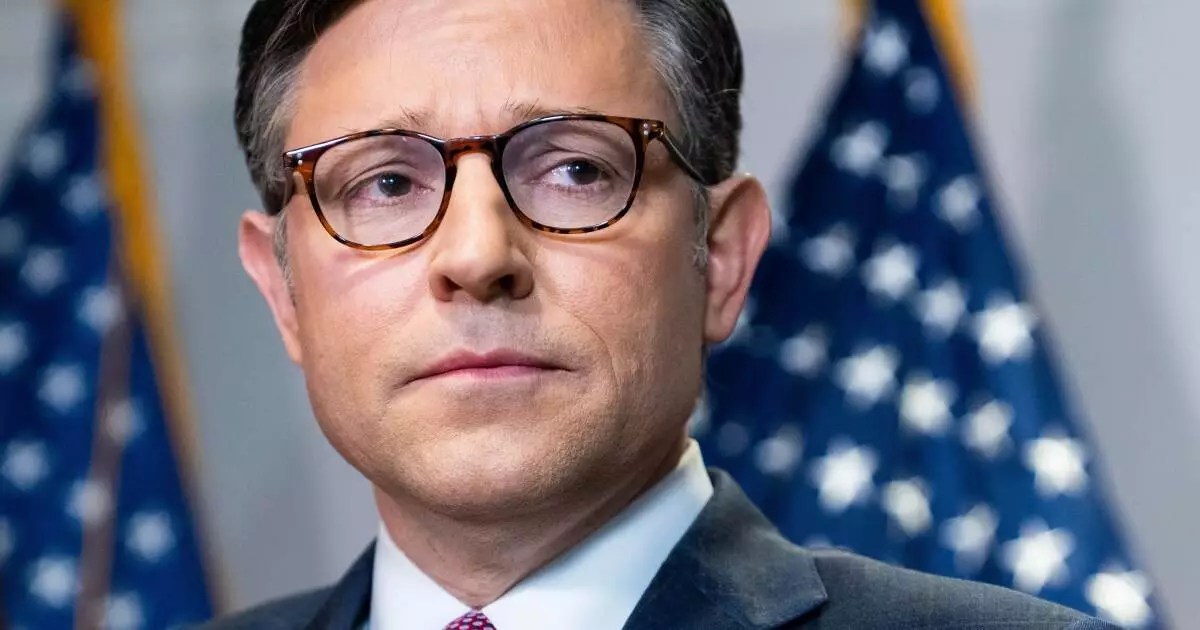As the fiscal deadline of September 30 approaches, tensions are mounting within the House Republican party regarding legislation intended to secure government funding. The depletion of federal funding, which affects the entire country, is at the heart of these disputes. Notably, a particular piece of legislation, known as the “Safeguard American Voter Eligibility Act,” is stirring up contention among lawmakers. This bill aims to tighten voting regulations by imposing additional hurdles to prevent non-citizen voting, a practice already prohibited by law.
House Speaker Mike Johnson from Louisiana is at the forefront of this initiative, emphasizing the significance of this legislation by stating, “This will be one of the most important votes that members of this chamber will ever take in their entire careers.” However, the urgency of this vote contrasts sharply with the reality of its reception among fellow Republicans. The anticipated voting session has been fraught with indecision, leading to a last-minute withdrawal from the agenda due to dissent from internal factions. Some members, particularly those advocating for increased military spending, are hesitant to engage in a dispute that could jeopardize broader fiscal discussions.
The implications of a government shutdown extend well beyond congressional chambers. The economic ripple effects could severely impact local governments and municipalities, many of which depend on federal funding. As stated by Nicole Weissman from the National Association of Counties, nearly a third of county revenue originates from intergovernmental sources. Ensuring the reliability of these funds is crucial for local entities striving to fulfill their administrative responsibilities.
The intricate relationship between local governments and federal funding becomes even more apparent when considering the reimbursement model of federal grants. Irma Esparza Diggs, a key figure in the National League of Cities, notes that local governments often front their own funds when undertaking projects, later receiving federal reimbursements. A disruption in this flow could create significant financial strain, burdening local authorities with unexpected debts and liabilities during a period of economic uncertainty.
Making matters more complex, the proposed budget package outlines a $1.6 trillion continuing resolution that would maintain current spending levels for an additional six months. This strategic move, which appears to be palatable to many in the Republican party, possesses underlying motivations tied to the upcoming elections. The specter of a potential Democratic executive and Congress after the next election might shift spending priorities, leading many lawmakers to embrace a short-term funding solution to buy time.
Navigating the appropriations process remains a formidable task marked by procedural complexities. Budget proposals begin with the presidential submission due in February of the prior fiscal year. Following this, both houses of Congress typically work to finalize appropriations bills by June 30. Current reports indicate that, by late July, only a fraction of fiscal year 2025 spending bills have successfully passed through the House, highlighting the legislative gridlock that plagues the process amid discussions on emergency funding and budgetary restructurings.
The controversial tenure of former Speaker Kevin McCarthy is a stark reminder of the volatility intrinsic to governmental finance maneuvers. His removal was fueled by intense disputes over spending allocations, including contentious funding for international military conflicts. The failure to streamline the budget process before the onset of a new fiscal year exemplifies the precariousness of congressional negotiations and the potential for significant disruption.
As federal lawmakers engage in the high-stakes game of fiscal negotiations, it becomes increasingly clear that bipartisan cooperation is essential. The threat of a government shutdown looms large, necessitating swift action to bridge partisan divides and prioritize pragmatic financial strategies. If compromises are not reached, both the federal and local levels may face dire repercussions, and the responsibility for these outcomes will inevitably fall on the shoulders of elected officials. In an era increasingly characterized by division, the necessity for collaborative governance has never been more pronounced.


Leave a Reply